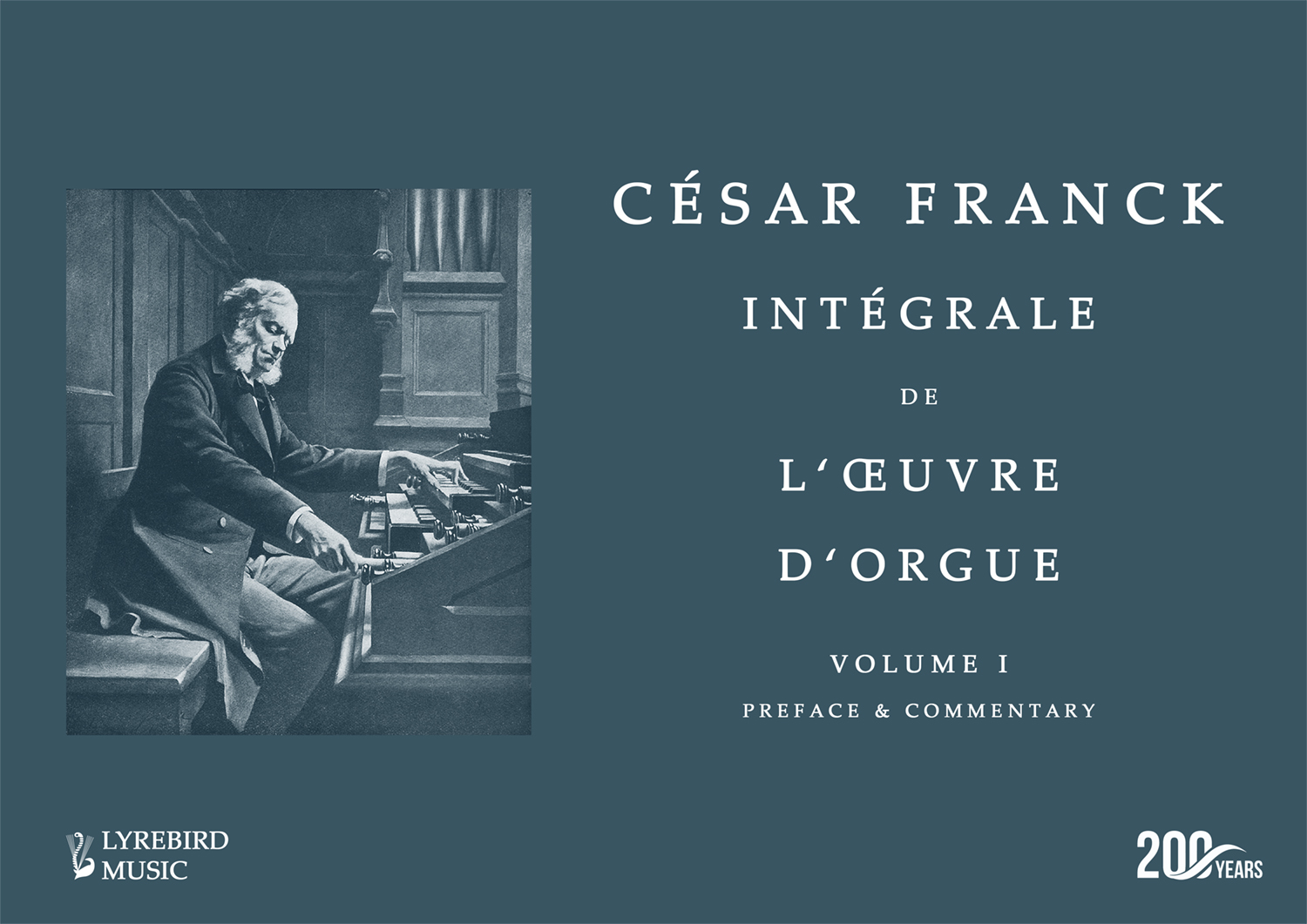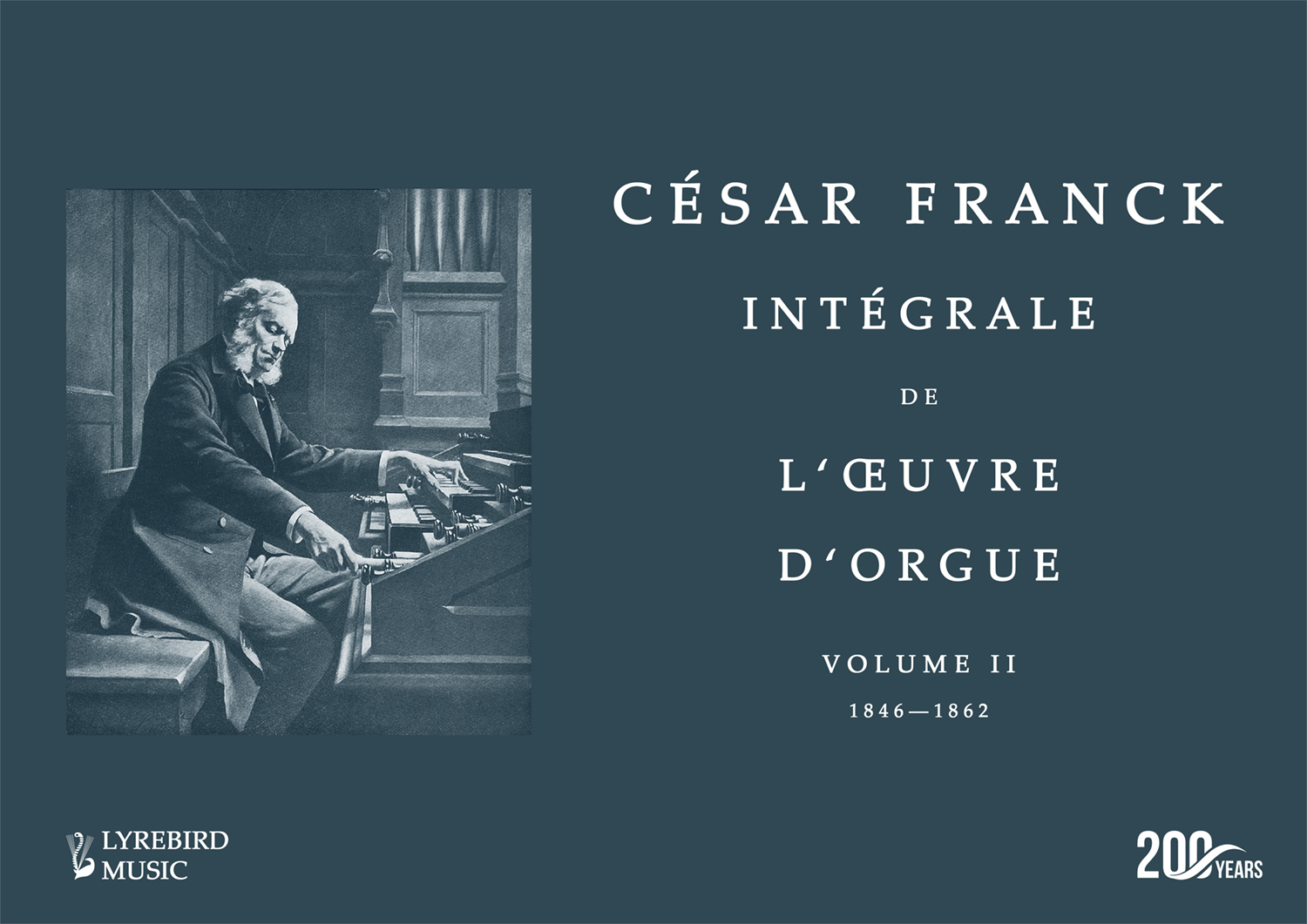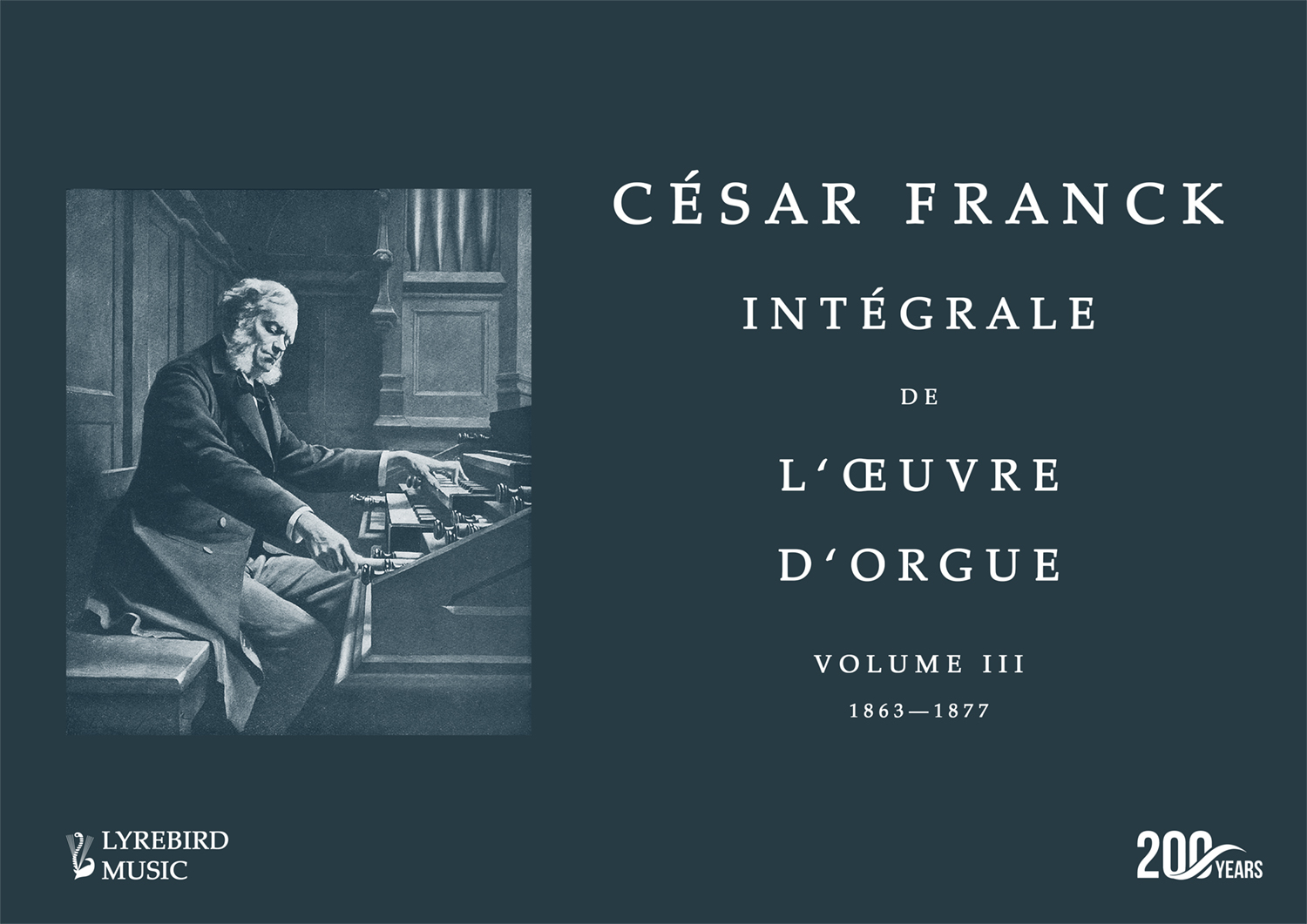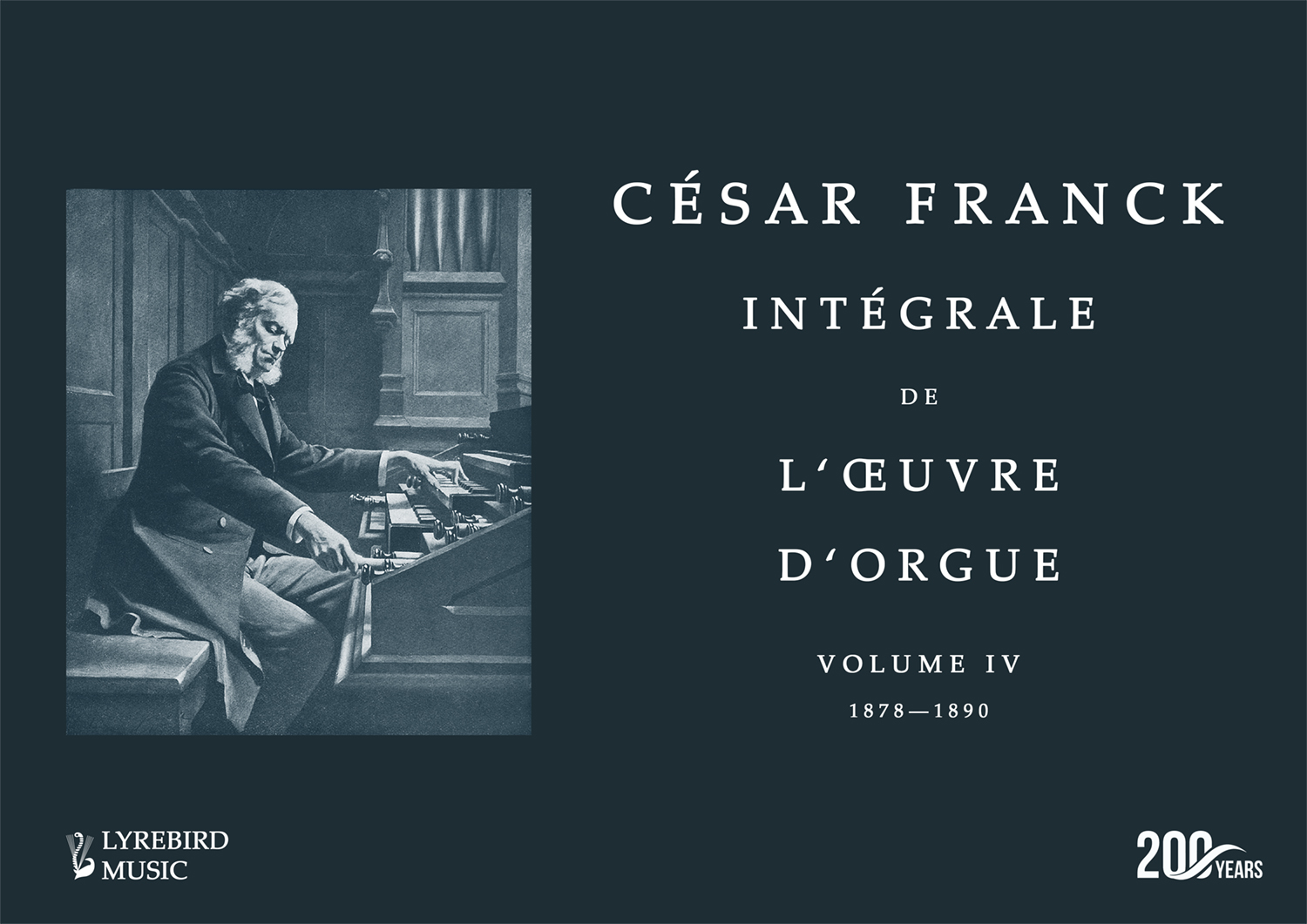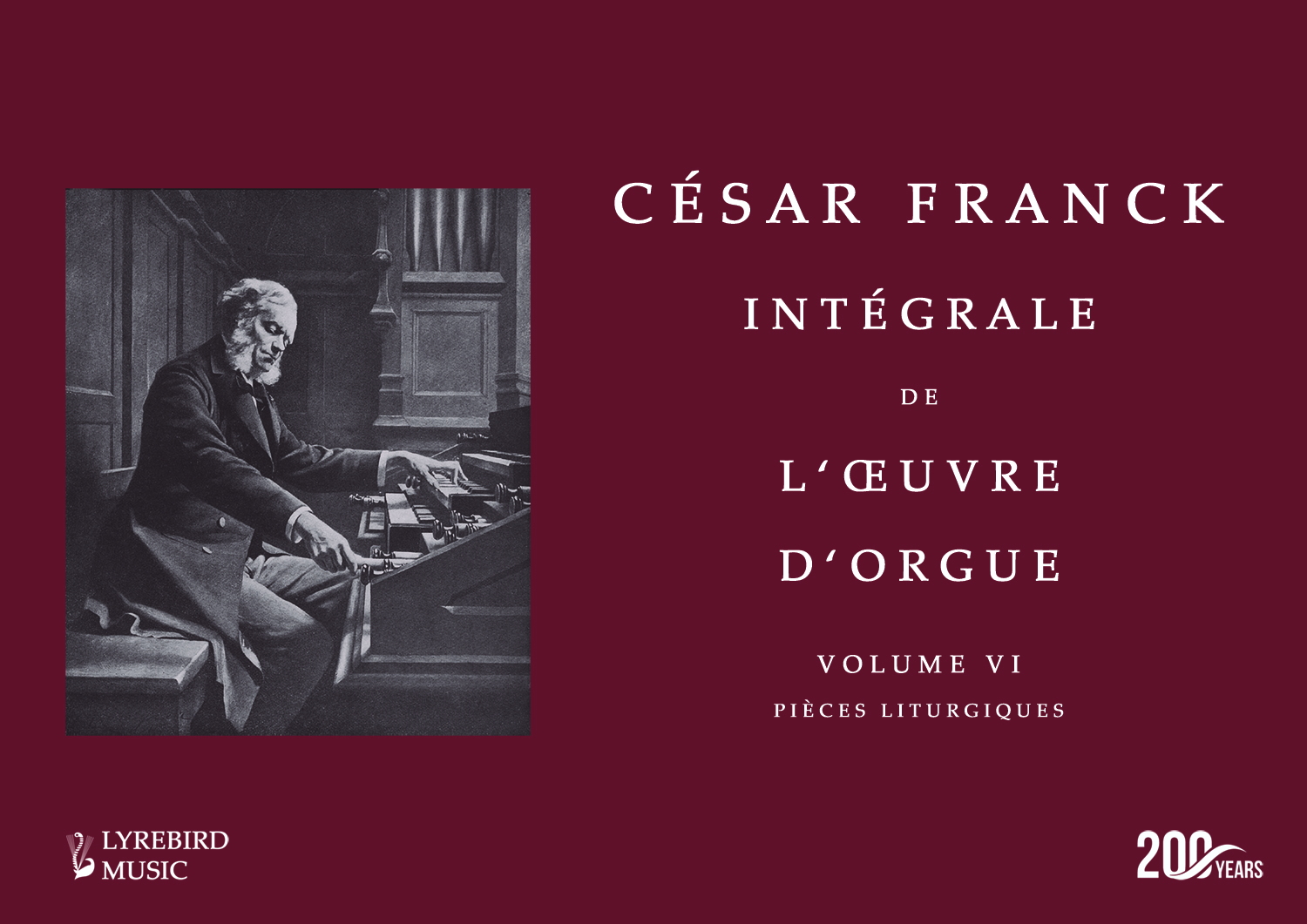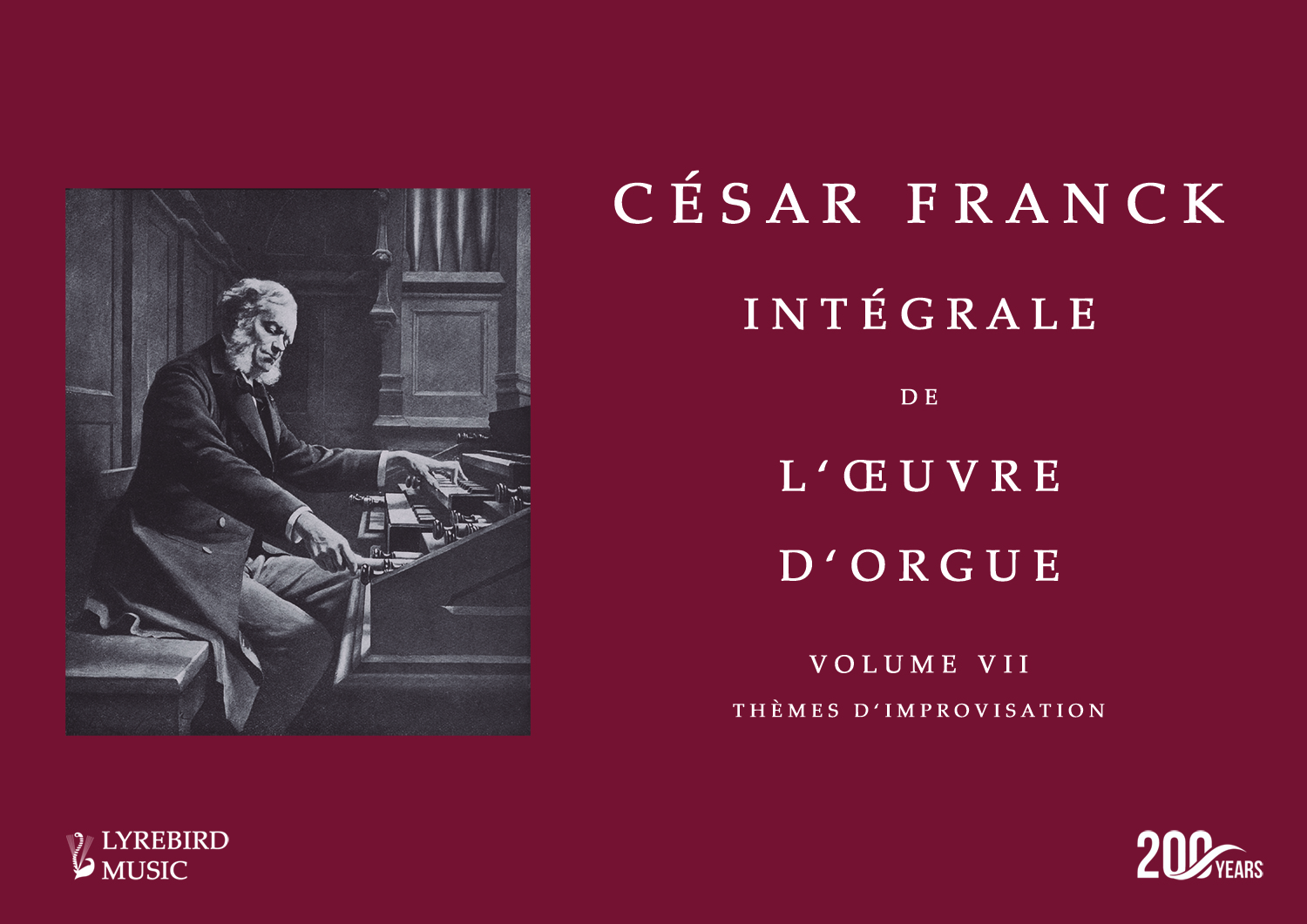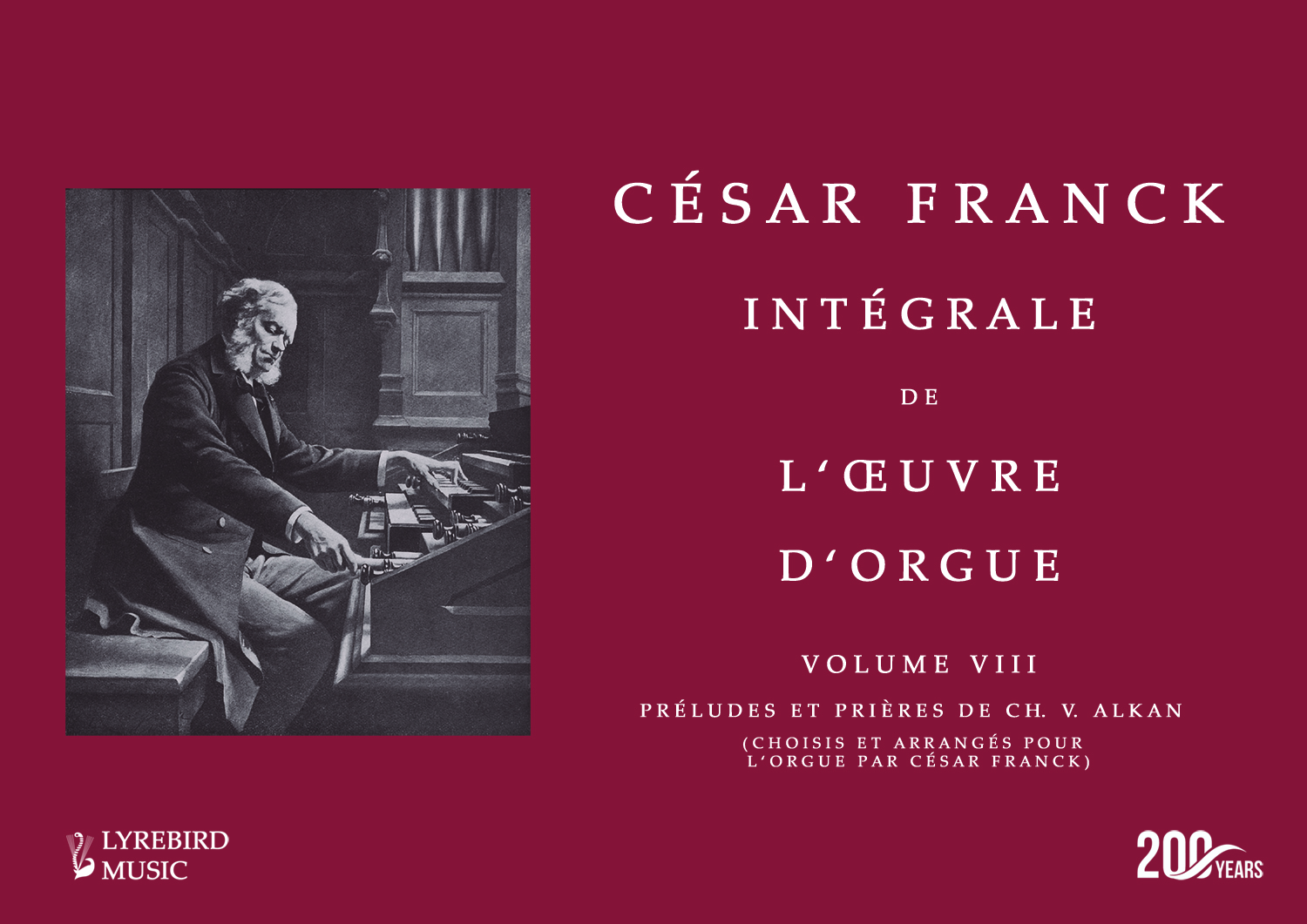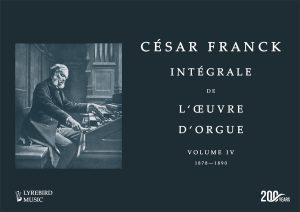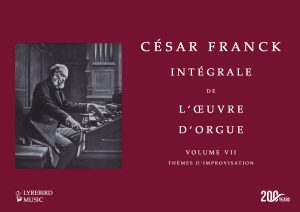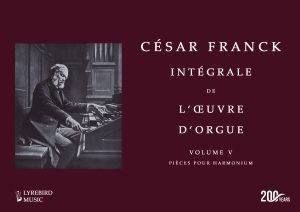LBMP–059: César Franck: Intégrale de l’œuvre d’orgue –– Complete (Second) Edition
From €210.99
ISBN: 978-1-917401-00-5 | 978-1-917401-01-2 | 978-1-917401-02-9 | 978-1-917401-03-6 | 978-1-917401-04-3 | 978-1-917401-05-0 | 978-1-917401-06-7 | 978-1-917401-07-4
Eight hardback volumes:
Volume I: Preface and commentary: 322 pages Volume II: 1846–1862: 158 pages Volume III: 1863–1877: 151 pages Volume IV: 1878–1890: 91 pages Volume V: 227 pages Volume VI: 211 pages Volume VII: 79 pages Volume VIII: 71 pages
Edited by Richard Brasier The principal features of this new edition include:
- A foreword by renowned Franck scholar Marie-Louise Langlais
- An erudite preface and commentary of 180,000 words on Franck’s works for organ and harmonium, the instruments he played (including his harmonium at Sainte-Clotilde), and his work as a liturgical organist, accompanied by examples, colour images, plates, and facsimiles
- A thorough evaluation of the organ and harmonium works based on every available source
- The first publication (engraving and colour facsimile) of Andante et Prière CFF 39bis for harmonium
- Full-colour facsimile of Pièce Héroïque (Trocadéro manuscript)
- Full-colour facsimile volume of Franck’s improvisation themes, with annotations
- Previously unseen images of Franck’s family, provided to the editor by his descendants
- A complete catalogue incorporating those of Georges Franck, Vincent d’Indy, Wilhelm Mohr and Joël-Marie Fauquet
- The first modern edition of Pièces pour l’Office ordinaire and Préludes et Prières de Ch. V. Alkan
- Two formats available:
- Hardback colour
- Tablet (PDF – eight downloads available for 5 days).
Prices vary according to your needs. Please first choose the format you require. N. B. For those wishing to upgrade Volumes I – IV, please contact us at post@lyrebirdmusic.com.
Please note that if you are an EU customer, the prices include the VAT for your area. This is collected for orders under €150. EU customers whose orders exceed €150 will see the VAT until checkout, at which point taxes will be removed.
It is a publication of the very highest quality which has been painstakingly researched and presented in an attractive, clear, concise and beautifully produced series of four volumes. In order to get the best out of this edition, it will mean buying Volume 1 in addition to whichever volumes of the music you need. But that’s not a hardship when you are purchasing such a comprehensive and valuable piece of academic work and all serious organists should own a complete set, and this should be the edition which they will want to use. I cannot commend it highly enough, and I will certainly be using it in all my recitals from now on.
‘An immense work, meticulous, detailed with the greatest skill. In short, a musicological edition of reference in which I am happy and proud to have participated.’
Marie-Louise Langlais
‘The result is spectacular […] an editor from the cold invited himself into the big leagues with a landmark realisation […] Pater seraphicus can be satisfied.’
Alain Pâris (La Lettre du Musicien)
‘This edition is a vade mecum, which will undoubtedly be an essential reference for a long time.
James Lipka (Nineteenth-Century Music Review)
The music of César Franck is revered by musicians the world over. For organists, he holds a significant place in history as one of the founding fathers of the French Romantic organ tradition. First published during the bicentennial year of his birth, Franck’s journey from unsettled pianist to master craftsman at the organ and harmonium is presented in a new light. The objective of this chronologically ordered edition spanning the three different periods of his life combines as many elements as possible from the study of available autograph manuscripts, first editions and letters in the hope of contributing to a more holistic evaluation, in practical terms, of his output for organ and harmonium.
Published during this bicentennial year of his birth, Franck’s journey from unsettled pianist to master craftsman at the organ is presented in a new light. The objective of this chronologically ordered edition spanning the three different periods of his life, combines as many elements as possible from the study of available autograph manuscripts, first editions and letters, in the hope of contributing to a more holistic evaluation, in practical terms, of his output for organ.
Editor Richard Brasier enjoys a busy and far-reaching international career as a concert organist and pedagogue. As an organist, Richard has performed extensively throughout the UK, Europe, and Asia in recital series and at major international festivals, using both period and modern instruments. Richard is a teacher for the Royal College of Organists, regularly teaches residential courses for organists of all ages and abilities, and visits conservatoires to lecture or teach on various specialist topics. He has been invited to serve as a competition adjudicator and external examiner, with former students achieving national and international success.
Richard has published articles and videos on organ-related topics on various platforms and has edited several performing editions, including the organ works of Ludwig van Beethoven and Heinrich Bach. In 2022, Richard established himself as a leading scholar of the organ music of César Franck with the publication of his internationally acclaimed edition for Lyrebird Music. He is the organist at St Mary’s German Lutheran Church in central London and curator organist at the historic German church of St George’s in Whitechapel. He graduated from the Royal Academy of Music, London, and the Hochschule für Musik und Tanz, Köln.
Volume I: Preface and Commentary
Introduction
Timeline
Notes on Performance Practice
Instruments
The works for Organ and Harmonium
[Grand Chœur] CFF 49
Pièce en mi bémol majeur CFF 50
[Pièce en la majeur] CFF 51
Prière CFF 52 (fragment)
Andantino FWV 25a / CFF 54a
Andantino FWV 25b / CFF 54b
[Fantaisie] CFF 53a
[Fantaisie] CFF 53b
Prélude, Fugue et Variation, Op. 18 / FWV 30 / CFF 30a
Fantaisie, Op. 16 / FWV 28 / CFF 53
Fantaisie CFF 53c
Grande Pièce Symphonique, Op. 17 / FWV 29 / CFF 98
Prélude, Fugue et Variation, Op. 18 / FWV 30 / CFF 30b
Pastorale, Op. 19 / FWV 31 / CFF 99
Prière, Op. 20 / FWV 32 / CFF 100
Final, Op. 21 / FWV 33 / CFF 101
Fantaisie FWV 35 / CFF 102
Cantabile FWV 36 / CFF 103
Pièce Héroïque FWV 37 / CFF 104
Trois Chorals
Choral I FWV 38 / CFF 105
Choral II FWV 39 / CFF 106
Choral III FWV 40 / CFF 107
Appendix A: Students of César Franck
Appendix B: Examination pieces (June 1874 to June 1890)
Appendix C: Catalogue of Works (2024)
Appendix D: Facsimile – Pièce Héroïque (Trocadéro manuscript)
Appendix E: Facsimile – Andante et Prière
Volume II: 1846 – 1862
[Grand Chœur] CFF 49
[Pièce en mi bémol majeur] CFF 50 (fragment)
[Pièce en la majeur] CFF 51
Prière CFF 52 (fragment)
Andantino CFF 54a/ FWV 25a
Andantino CFF 54b / FWV 25b
[Fantaisie] CFF 53a / FWV 28a
[Fantaisie] CFF 53b / FWV 28b
Prélude, Fugue, Variation, Op. 18 (Orgue/harmonium & pianoforte with parts)
Volume III: (1863 – 1877)
Fantaisie, Op. 16
[Fantaisie] CFF 53c
Grande Pièce Symphonique, Op. 17
Prélude, Fugue et Variation, Op. 18
Pastorale, Op. 19
Prière, Op. 20
Final, Op. 21
Volume IV: (1877 – 1890)
Fantaisie CFF 102
Cantabile CFF 103
Pièce Héroïque CFF 104
Choral I CFF 105
Choral II CFF 106
Choral III CFF 107
Volume V: Pièces pour Harmonium
Cinq Pièces CFF 32
1. Offertoire
2. Petit Offertoire
3. Verset 1
4. Verset 2
5. Communion
[Pièces pour Harmonium]
Offertoire sur un noël Breton CFF 34
Quasi Marcia, Op. 22
Quasi Marcia CFF 35a
Entrée CFF 37
Andante et Prière CFF 39bis
Sept Pièces en Ut majeur et Ut mineur CFF 40
1–6 ~
Amen
7. Offertoire
Sept Pièces en Ré b majeur et Ut # mineur CFF 41
1–6 ~
Amen
7. Offertoire
Sept Pièces en Ré majeur et Ré mineur [pour le temps de noël] CFF 42
1. ~
2. Chant de la Creuse
3. ~
4. Vieux Noël
5. ~
6. Vieux Noël
Amen
7. Sortie ou Offertoire
Sept Pièces en Mi b majeur et Mi b mineur CFF 43
1–6 ~
Amen
7. Offertoire
Sept Pièces en Mi mineur et Mi majeur CFF 44
1–6 ~
Amen
7. Offertoire
Sept Pièces en Fa majeur et Fa mineur CFF 45
1–6 ~
Amen
7. Sortie
Sept Pièces en Fa # mineur et Sol b majeur CFF 46
1. Air Béarnais
2. Chant Béarnais
3–6. ~
Amen (Published version)
Amen (First version)
7. Offertoire Funèbre
Sept Pièces en Sol majeur et Sol mineur [pour le temps de noël] CFF 47
1. ~
2. Vieux Noël
3. Noël Angevin
4. ~
5. Noël Angevin
6. ~
Amen
7. Sortie
[Sept] Pièces en La b majeur [et Sol # mineur] CFF 48
1–[6]. ~
[7.] Sortie en La b
Volume VI: Pièces Liturgiques
Trois Antiennes CFF 91
1. Quasi lento
2. Allegretto
3. Lent et très soutenu
[Deux Pièces]
1. Petit Offertoire CFF 38
2. [Pièce] CFF 39
Pièces pour l’office ordinaire CFF 33, CFF 36b, CFF 55–90 and CFF 92–97
1. Offertoire en Fa mineur CFF 55
2. Offertoire en [Mi b] [pour orgue] CFF 36b
3. Offertoire [pour harmonium] CFF 36a
4. Élévation en La CFF 93
5. Magnificat en Ré CFF 58
6. Grand Chœur en Ré CFF 59
7. Andantino en Ré CFF 60
8. Quasi Marcia en Ré mineur CFF 61
9. Allegretto en Ré CFF 62
10. Grand Chœur en Ré CFF 63
11. Amen en Ré CFF 64
12. Gloria Patri en Ré CFF 65
13. Offertoire en La CFF 33
14. Quasi lento en Fa CFF 66
15. Allegretto en Ut mineur CFF 67
16. Andantino en Ut CFF 68
17. Allegretto en Ré mineur CFF 69
18. Allegretto non troppo en Ré CFF 70
19. Magnificat en Mi b CFF 71
20. [Magnificat] en Mi b CFF 72
21. Grand Chœur en Mi b CFF 73
22. Moderato con moto en Mi b CFF 74
23. Andantino en Mi b CFF 75
24. Allegretto non troppo en Mi b CFF 76
25. Gloria Patri en Mi b CFF 77
26. Gloria Patri en Mi b CFF 78
27. Amen en Mi b CFF 79
28. Gloria Patri en Mi b CFF 80
29. Prélude pour l’Ave Maris Stella en Ré mineur CFF 81
30. Prélude pour l’Ave Maris Stella en Ré CFF 82
31. Prélude pour l’Ave Maris Stella en Ré mineur CFF 83
32. Benedicamus en Do CFF 84
33. Lento en Ré mineur CFF 85
34. Andantino en La b CFF 86
35. Kyrie de la Messe de Noël en Ut mineur CFF 87
36. Moderato en Ut mineur CFF 88
37. Moderato en Ut mineur CFF 89
38. Grand Chœur en Ut mineur CFF 90
39. Grand Chœur en Ut CFF 56
40. Offertoire pour la Messe de minuit en Ré mineur CFF 57
41. Offertoire en Sol mineur CFF 92
42. Sortie en Ré CFF 94
43. Offertoire en Fa # mineur CFF 96a
44. Petit Offertoire CFF 96b
45. Allegro Moderato en Ré b CFF 97
46. Offertoire en Si CFF 95
Recueil de Noëls CFF 249
[1–54]
[Recueil de Noëls]
1. Quel est ce brillant éclair?
2. Quel est ce brillant éclair?
3. J’ai couru dans le hameau (ou: dans le calme de la nuit)
4. L’heureuse nouvelle (ou: Bénissons à jamais)
5. Fidèles pastoureaux
6. Un Dieu vient de naître
7. Ô Vierge Sainte vous avez un bonheur achevé
8. Que chacun s’éveille
9. Allegretto
10. Quoi ma voisine es-tu fâchée
11. Aimable nuitée
12. Tout mon héritage
13. Pasteurs qui sur ces montagnes
14. 3 Rois d’Orient sont venus
15. 3 Rois du fond de l’Arabie
16. Silence ciel
[Notes pour les Vêpres du Lundi de Pâques]
[Registrations pour un Magnificat]
Volume VII: Thèmes d’improvisation
[Sujets de fugue et d’improvisation pour la classe d’orgue de César Franck au Conservatoire]
[Notes préparatoires pour des improvisations liturgiques]
[Deux thèmes d’improvisation communiquée par Gabriel Pierné]
Volume VIII: Préludes et Prières de Ch. V. Alkan (Choisis et arranges pour l’orgue par César Franck)
1er Livre
No 7 des Préludes
No 5 des Prières
No 11 des Prières
2e Livre
No 3 des Préludes
No 3 des Pièces pour Harmonium
No 1 des Prières
No 2 des Prières
3e Livre
No 6 des Prières
Dieu des armées (Prière)
No 9 des Prières
Richard Brasier plays Choral II in B minor and Grand Pièce Symphonique in a concert for Beauty in Sound, using a Hauptwerk sample set from Saint Ouen, Rouen, and discusses his new edition:
0:00:00 | Ladies and Gentlemen, please take your seats 0:00:36 | Welcome from Richard McVeigh 0:02:49 | Franck – Choral No 2 0:18:16 | Hello and welcome from Richard Brasier 0:22:05 | Debussy – Arabesque No 1 0:27:57 | Bach – Schmücke dich, o liebe Seele BWV 654 0:37:20 | Franck – Grande Pièce Symphonique 1:06:11 | Live chat and questions with Richard and Richard
Richard Gowers plays Prière (Op. 20 in C# Minor from Six Pièces) using the new edition on the Lewis 1911 Organ of PIME Seminary Church, Sotto il Monte Giovanni XXIII (Bergamo), Italy.
https://youtu.be/SPDRVVYDR6o
La Lettre du Musicien, October 2022:
The result is spectacular […] an editor from the cold invited himself into the big leagues with a landmark realization […] Pater seraphicus [Franck] can be satisfied.’
Organist’s Review, February 2023
2022 was the year of the bicentenary of the birth of César Franck in 1822, and to mark this celebration of a significant French composer, Lyrebird Music have published a new edition of his organ works, skilfully edited by Richard Brasier. Franck was responsible for establishing a school of organ composition in France which would prove to be a formidable influence on succeeding Parisian organists and composers, notably Widor, Vierne, Dupre and Duruflé. In addition to Franck’s own manuscripts, there is also a plethora of archival material amongst collectors and those archives inherited by the Bibliotheque nationale de France, so there has been much material to back up Brasier’s research for this edition.
Franck’s manuscripts and earlier publications of his works, now well established, have however left many questions unanswered and generations of editors have tried to find solutions to inconsistencies, though not always with the academic rigour one might expect. Richard Brasier has applied an analytical approach with an admirable amount of research in an endeavour to make this new edition the ‘go to’ version for organists. I have to say that he has succeeded magnificently and his many hours of detailed research will be much appreciated by generations of organists to come.
The edition is very easy to read and has been printed on good quality paper and in a font which is clear and easy on the eye. Published in four volumes, Volume 1 is the Preface and Commentary with a foreword by Marie-Louise Langlais. This volume contains much interesting and useful historical information, as well as detailed notes on performance practice, spotlighting Franck’s pianistic background and evidence of this throughout his organ repertoire. Brasier also emphasises the necessity in Franck’s music for the legato style advocated by Lemmens and Guilmant alongside the fiery tonal colours of the reeds on Cavaillé-Coll organs and discusses performance traditions in use at Franck’s time and how these relate to those instruments. There is also much scrutiny of those unanswered questions in earlier editions and Brasier has found compelling and logical answers to many of these in the detailed commentary on the works, using Franck’s own manuscripts as his primary source. Brasier also goes into registrational issues of the repertoire in some depth with a detailed account of the instruments known to Franck, and especially the organ at Sainte-Clotilde where Franck was Titulaire. (an instrument which has seen much change over the years) Included are specifications and cross-sections of the Sainte-Clotilde console and mechanism in Franck’s day. This is all fascinating and highly informative and will help to shape the playing of Franck amongst organists minded to read and take all this on board. It will also help to give an insight into how to play this music on non-French instruments. The commentary also includes a facsimile of Franck’s Piece Héroique, (Tracadéro manuscript) which shows the composer’s neat and fastidious hand.
One thing which I found fascinating is a list of the metronome speeds used by a variety of French organists on their recordings of the Choral No.3. These include Tournemire. (a successor of Franck’s at Sainte-Clotilde) Bonnet, Dupré, Marchal, Langlais and Duruflé. There is also a catalogue of his works which includes information such as date of completion, date of first performance and where the manuscript can be found.
Lyrebird Music and editor Richard Brasier can be justly proud of this new edition. It is a publication of the very highest quality which has been painstakingly researched and presented in an attractive, clear, concise and beautifully produced series of four volumes. In order to get the best out of this edition, it will mean buying Volume 1 in addition to whichever volumes of the music you need. But that’s not a hardship when you are purchasing such a comprehensive and valuable piece of academic work and all serious organists should own a complete set, and this should be the edition which they will want to use. I cannot commend it highly enough, and I will certainly be using it in all my recitals from now on.
Malcolm Archer

